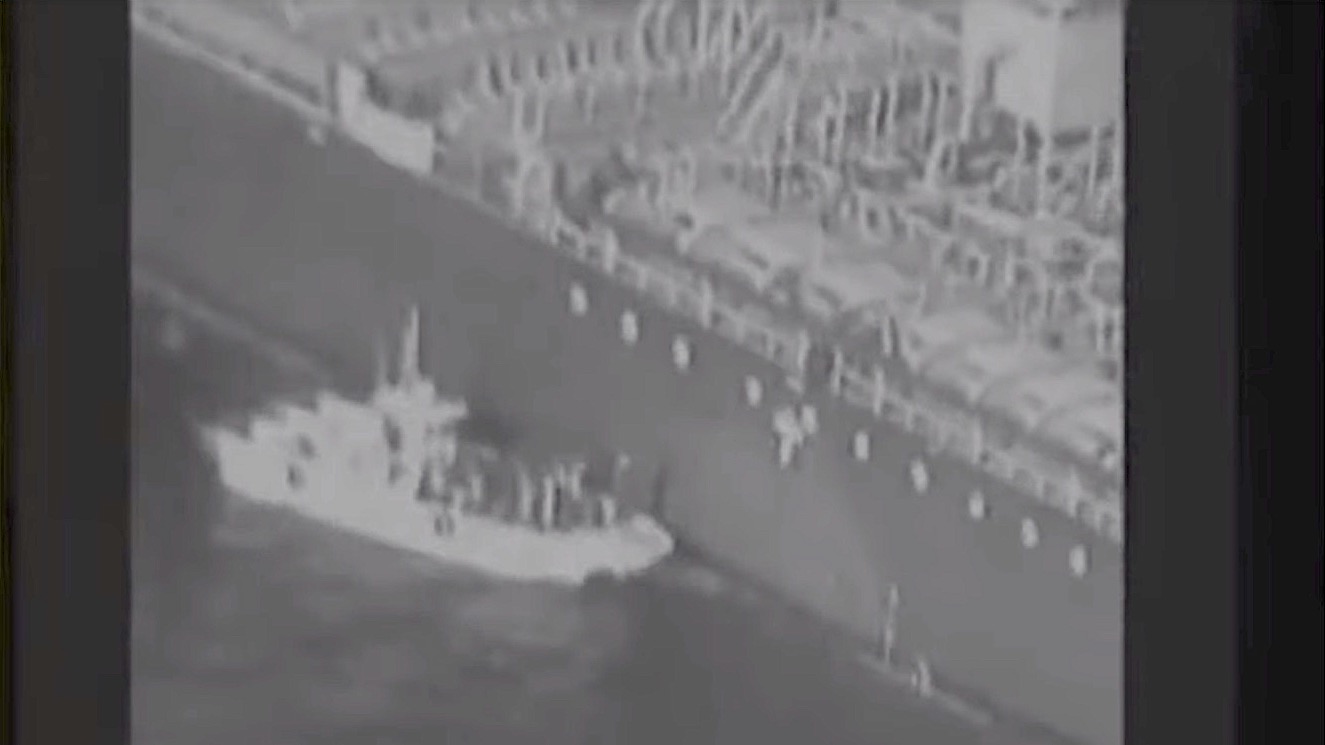U.S. releases video purportedly linking Iran to explosions on 2 tankers


A free daily email with the biggest news stories of the day – and the best features from TheWeek.com
You are now subscribed
Your newsletter sign-up was successful
Secretary of State Mike Pompeo blamed Iran on Thursday for early-morning explosions that disabled two tankers near the Strait of Hormuz, saying U.S. intelligence, the level of expertise needed to carry out the "blatant attack," and recent events suggested Iran was the culprit.
U.S. officials echoed those allegations at an emergency United Nations Security Council meeting in New York later Thursday, after which Iran "categorically" rejected the "unfounded claims" from the U.S., condemned the attacks "in the strongest possible terms," and urged "the U.S. and its regional allies must stop warmongering and put an end to mischievous plots as well as false flag operations in the region."
Early Friday, U.S. Central Command released a black-and-white video from a U.S. surveillance aircraft, describing it as showing Iranian sailors on a Revolutionary Guard boat removing an unexploded limpet mine from the side of one of the two damaged tankers, the Japanese-owned chemical tanker Kokura Courageous, on Thursday afternoon. Limpet mines attach to ship hulls and disable but don't destroy the vessel.
The Week
Escape your echo chamber. Get the facts behind the news, plus analysis from multiple perspectives.

Sign up for The Week's Free Newsletters
From our morning news briefing to a weekly Good News Newsletter, get the best of The Week delivered directly to your inbox.
From our morning news briefing to a weekly Good News Newsletter, get the best of The Week delivered directly to your inbox.

The Kokuka Courageous's Japanese owners said the crew saw "flying objects" before the explosion, suggesting mines were not the cause. The second ship, the Norwegian-owned MT Front Altair, burned for hours. All crew members from both ships were evacuated safely.
The apparent attack on the Japanese ship "appeared timed to undermine diplomatic efforts by Japan's prime minister, Shinzo Abe, who was wrapping up a high-stakes visit to Tehran," The Washington Post reports. There is a "widening split between pro-diplomacy officials in Iran and hard-liners opposed to further negotiations, including the Islamic Revolutionary Guard Corps," a paramilitary group that reports only to Iran's supreme leader, Ayatollah Ali Khamenei. The Revolutionary Guard and other Iranian security services "have a decades-long history of conducting attacks and other operations aimed precisely at undermining the diplomatic objectives of a country's elected representatives," the Eurasia Group think tank said in a note Thursday.
A free daily email with the biggest news stories of the day – and the best features from TheWeek.com
Peter has worked as a news and culture writer and editor at The Week since the site's launch in 2008. He covers politics, world affairs, religion and cultural currents. His journalism career began as a copy editor at a financial newswire and has included editorial positions at The New York Times Magazine, Facts on File, and Oregon State University.
-
 Crisis in Cuba: a ‘golden opportunity’ for Washington?
Crisis in Cuba: a ‘golden opportunity’ for Washington?Talking Point The Trump administration is applying the pressure, and with Latin America swinging to the right, Havana is becoming more ‘politically isolated’
-
 5 thoroughly redacted cartoons about Pam Bondi protecting predators
5 thoroughly redacted cartoons about Pam Bondi protecting predatorsCartoons Artists take on the real victim, types of protection, and more
-
 Palestine Action and the trouble with defining terrorism
Palestine Action and the trouble with defining terrorismIn the Spotlight The issues with proscribing the group ‘became apparent as soon as the police began putting it into practice’
-
 Nobody seems surprised Wagner's Prigozhin died under suspicious circumstances
Nobody seems surprised Wagner's Prigozhin died under suspicious circumstancesSpeed Read
-
 Western mountain climbers allegedly left Pakistani porter to die on K2
Western mountain climbers allegedly left Pakistani porter to die on K2Speed Read
-
 'Circular saw blades' divide controversial Rio Grande buoys installed by Texas governor
'Circular saw blades' divide controversial Rio Grande buoys installed by Texas governorSpeed Read
-
 Los Angeles city workers stage 1-day walkout over labor conditions
Los Angeles city workers stage 1-day walkout over labor conditionsSpeed Read
-
 Mega Millions jackpot climbs to an estimated $1.55 billion
Mega Millions jackpot climbs to an estimated $1.55 billionSpeed Read
-
 Bangladesh dealing with worst dengue fever outbreak on record
Bangladesh dealing with worst dengue fever outbreak on recordSpeed Read
-
 Glacial outburst flooding in Juneau destroys homes
Glacial outburst flooding in Juneau destroys homesSpeed Read
-
 Scotland seeking 'monster hunters' to search for fabled Loch Ness creature
Scotland seeking 'monster hunters' to search for fabled Loch Ness creatureSpeed Read
